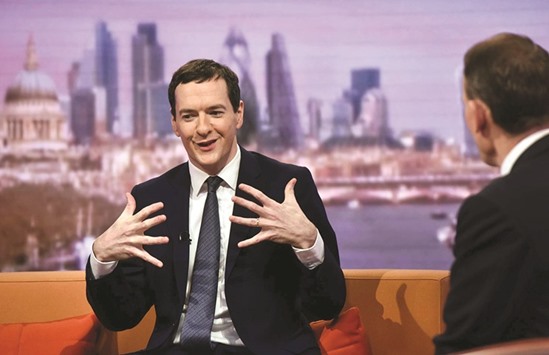
Chancellor of the Exchequer George Osborne speaks on the BBC’s Andrew Marr Show in London.
Finance Minister George Osborne yesterday warned of further spending cuts to come in the government budget to be unveiled this week.
The chancellor of the exchequer said he needed to find savings by 2020 equivalent to 50 pence in every £100 the government spends.
“The world is a more uncertain place than at any time since the financial crisis and we need to act now so we don’t pay later,” he told BBC television.
“That’s why I need to find additional savings equivalent to 50 pence in every £100 the government spends by the end of the decade because we have got to live within our means to stay secure and that’s the way we make Britain fit for the future.” But he said the cuts are “not a huge amount in the scheme of things”.
Osborne had slowed the pace of austerity cuts in his last spending review in November but has now clearly signalled fresh reductions are on the cards in Wednesday’s budget.
Official figures out last month showed that the economy slowed sharply last year.
Osborne said £18bn had been revised off Britain’s nominal gross domestic product - the total value of all goods and services produced by a country’s economy.
“That’s a number out there last year because inflation was lower,” the chancellor said.
GDP expanded by 2.2% last year, down from 2.9% in 2014.
“All around the world every Western country, and indeed in big emerging countries like China, Brazil, Russia, people are looking at economic prospects and thinking they are not as rosy as they were just a few months ago,” said Osborne.
The economy faces headwinds from slowing Chinese growth and problems in the economies of European Union countries.
It also faces uncertainty ahead of a referendum on June 23 on whether to leave the EU.
Former chancellor Ken Clarke suggested Osborne should carry out “tough and difficult” measures now as it was early in the five-year parliamentary cycle.
Clarke told Sky News’ Murnaghan programme: “The global economy is certainly slowing down. Markets are very jittery and if you look at the biggest problem in the short-term in Britain, it is that we are still running a deficit and we are still piling up debt and that slows down the prospects of growth.
“You’ve got all the other structural changes we’ve got to make, all the things we are doing on skills, training, infrastructure spending, trying to rebalance the economy.
“George has got to get on with that and this is the first Budget in a five-year parliament so if I were him, I’d want to do some of the tough and difficult things now.”
